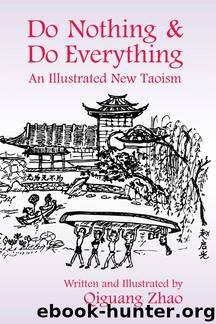Do Nothing & Do Everything: An Illustrated New Taoism by Qiguang Zhao

Author:Qiguang Zhao [Zhao, Qiguang]
Language: eng
Format: mobi, epub
Tags: life, Wu Bu Wei, yin yang, health, Taoism, happiness, Wu Wei
ISBN: 9781610830485
Publisher: Paragon House
Published: 2011-09-26T16:00:00+00:00
Cyril Birch, ed. Anthology of Chinese Literature, trans. Burton Watson (New York: Grove Press, 1965), 121.
21 Beauty
Mao Qiang and Li Ji were beautiful in the eyes of men, but when the fish saw them, they sank deep. When the birds saw them, they flew high, and when deer saw them, they dashed away. Who among them can see real beauty in the world?
—Zhuangzi
Philosophers and thinkers all over the world have talked about beauty for thousands of years. Beauty has become a sphinx; we think that if we can resolve the meaning of beauty, we can save our spiritual world. For a Chinese peasant in times of drought, a black cloud over the land is the most beautiful thing in the world. A medieval knight might say that a lock of his lady’s hair is the most beautiful thing in the world. A Wall Street trader may see a rise in the NASDAQ as the most beautiful thing in the world. A mathematician sees beauty in a perfect equation or an elegant proof. In reality, these people are not talking of beauty but of their need for satisfaction. Beauty is not a need, not a thirsty lip or an outstretched hand, but a spiritual experience, a burning heart and a hungry mind. Beauty is not the achievement of a goal.
When he was in Qi, Confucius heard the music of Shao, and he was so moved that for three months, he didn’t taste meat. He said, “I did not imagine that any music existed which could reach such perfection as this.”
—Confucius, Analects
Confucius experienced real beauty. He did not have an intimate need for this music, his survival did not depend on it, but he could not deny that he had a thirsty heart, humiliated and hurt by the world. When he observed this music, it overcame his need for meals. Beauty is nature. Emerson once said, “A nobler want of man is served by nature, namely, the love of beauty.”
As an opposite, success meets our needs. From success, you get lots of things, but not that great, inner feeling that beauty brings us. Beauty is a process without a goal. Beauty is Wu Wei, because it cannot be possessed.
You will not be able to have everything in the world. If you did, where would you put it? You cannot have all the success in the world. If you did, how could you bear it? However, you can have the most beautiful thing in the world, because you do not possess it, and you do not move it into your property from somewhere else. You see it, you experience it, and you feel it, but you do not keep it to yourself. The beauty of beauty is that it is not yours; you cannot take beauty from the universe and deny other peoples’ access to it. Success is limited, but beauty is limitless.
Download
Do Nothing & Do Everything: An Illustrated New Taoism by Qiguang Zhao.epub
This site does not store any files on its server. We only index and link to content provided by other sites. Please contact the content providers to delete copyright contents if any and email us, we'll remove relevant links or contents immediately.
| Confucianism | Feng Shui |
| I Ching | Jainism |
| Karma | Shintoism |
| Sikhism | Tao Te Ching |
| Taoism | Tibetan Book of the Dead |
| Zoroastrianism |
The Tao of Physics by Fritjof Capra(2276)
Human Design by Chetan Parkyn(2072)
The Diamond Cutter by Geshe Michael Roach(2060)
Feng Shui by Stephen Skinner(1940)
The Alchemy of Sexual Energy by Mantak Chia(1860)
Tao Te Ching by Lao Tzu(1841)
365 Tao: Daily Meditations by Ming-Dao Deng(1621)
Tao Tantric Arts for Women by Minke de Vos(1599)
Sun Tzu's The Art of War by Giles Lionel Minford John Tzu Sun(1541)
Sidney Sheldon (1982) Master Of The Game by Sidney Sheldon(1520)
Buddhism 101 by Arnie Kozak(1511)
Karma-Yoga and Bhakti-Yoga by Swami Vivekananda(1495)
The Analects of Confucius by Burton Watson(1436)
The Art of War Other Classics of Eastern Philosophy by Sun Tzu Lao-Tzu Confucius Mencius(1428)
Tao te ching by Lao Tzu(1366)
The Way of Chuang Tzu by Thomas Merton(1364)
The New Bohemians Handbook by Justina Blakeney(1355)
The Sayings Of by Confucius(1316)
Bless This House by Donna Henes(1270)
